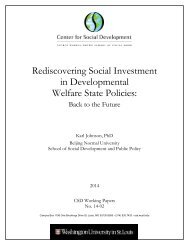Exploring and Assessing Intercultural Competence - Center for ...
Exploring and Assessing Intercultural Competence - Center for ...
Exploring and Assessing Intercultural Competence - Center for ...
Create successful ePaper yourself
Turn your PDF publications into a flip-book with our unique Google optimized e-Paper software.
- learned about communication<br />
- opportunity to develop myself<br />
- constantly learn from them (3)<br />
- this helps me to work better (2)<br />
- became more open (3)<br />
- helps me to recognize differences among cultures (2)<br />
- learned of the impact this experience has on them<br />
- helps me to underst<strong>and</strong> (2)<br />
- to become friends<br />
- to become more tolerant<br />
<strong>Exploring</strong> <strong>and</strong> <strong>Assessing</strong> <strong>Intercultural</strong> <strong>Competence</strong><br />
It is clear that host mentors were impacted in various ways through interactions with the<br />
volunteers – in areas of knowledge, attitudes, skills, <strong>and</strong> awareness. ICC contact has the potential<br />
to affect both/all parties in the interaction – volunteers <strong>and</strong> hosts alike – whether at home or<br />
abroad. The phrase, “looking out is looking in,” acquires more meaning when we also include the<br />
hosts who through contact with <strong>for</strong>eigners also began processes of reflection <strong>and</strong> introspection<br />
that might not otherwise have occurred. Hence, the provocative two-way nature of IC contact is<br />
clear, no matter the setting.<br />
Assertion No. 7: People are changed as a result of this experience<br />
Assertion No. 8: Some returnees lean toward specific life choices, life partners, life styles,<br />
values <strong>and</strong> jobs as a result of this experience<br />
(Use of ICC Abilities in Life <strong>and</strong> Work)<br />
Discussion<br />
Mentors speak to these points during interviews in the following ways:<br />
(FEMS1+I)<br />
- “I’ve been applying these abilities in my work day by day because my job dem<strong>and</strong>s this.<br />
Respect <strong>and</strong> openness are the basis of this job since it allows people to respect <strong>and</strong> care about<br />
themselves <strong>and</strong> these are the values we also try to share with the people who live in extreme<br />
poverty. This experience (with the volunteers) helps me to underst<strong>and</strong> many differences among<br />
people of diverse cultures <strong>and</strong> even inside the same culture. On the personal side, this experience<br />
has turned me into a more respectful person.”<br />
(FEMS3+I)<br />
- “My job involves interpersonal skills, there<strong>for</strong>e the experience (with volunteers) helps me to<br />
know how to get along with people from other cultures. (My experience with volunteers) has<br />
helped me to improve these skills.”<br />
(FEMS4+I)<br />
- “ I use these abilities all the time since I have constant contact with volunteers at work. In my<br />
own life, I find that I miss this contact later because we become so close to each other. During<br />
this experience, I learned to respect people from other countries on a higher level, avoiding the<br />
use of terms such as ‘gringo’ which offends <strong>for</strong>eigners <strong>and</strong> explaining this to those around me.”<br />
<strong>Center</strong> <strong>for</strong> Social Development<br />
Washington University in St. Louis<br />
58
















